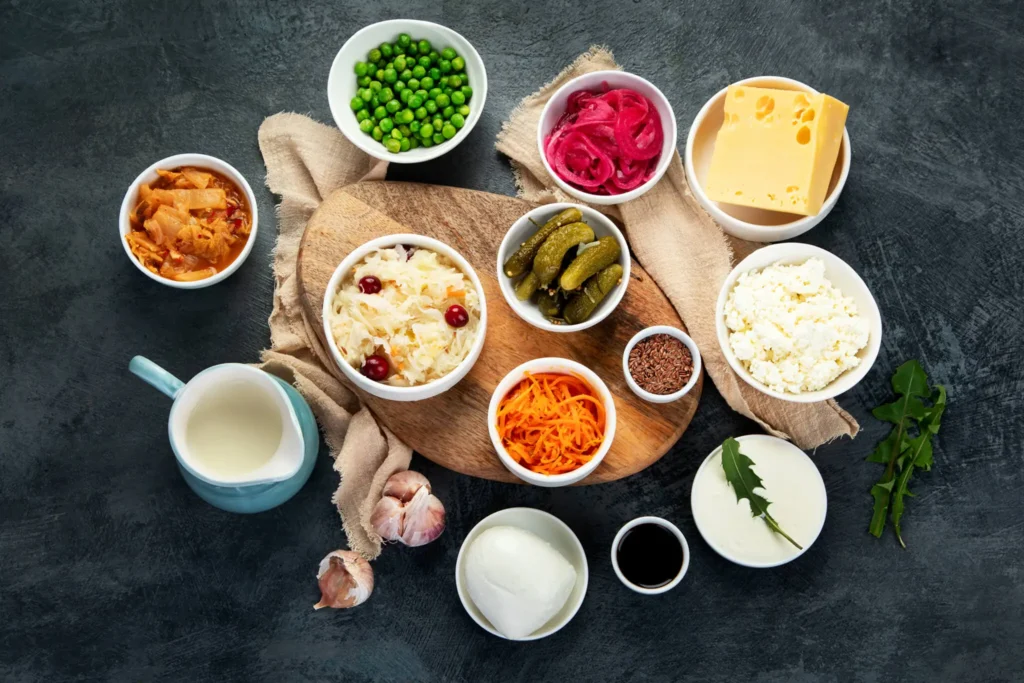Probiotics are live microorganisms that provide a range of health benefits, especially when it comes to gut health. These “good bacteria” support a balanced digestive system and can even boost your immune system. Including probiotic-rich foods in your diet can enhance gut flora, support digestion, and contribute to overall well-being. If you’re looking to incorporate more probiotics into your meals, here are the top 5 foods to consider.
1. Yogurt
Yogurt is perhaps the most well-known probiotic food. It is made by fermenting milk with beneficial bacteria, such as Lactobacillus and Bifidobacterium. The live cultures in yogurt can improve digestion by balancing the gut microbiome, promoting a healthy immune system, and potentially reducing the risk of certain gastrointestinal issues. When choosing yogurt, look for labels that say “live and active cultures” to ensure it contains beneficial probiotics.
Health Benefits:
- Supports digestion and gut health
- Boosts the immune system
- May help reduce symptoms of lactose intolerance
2. Kefir
Kefir is a fermented dairy product similar to yogurt but with a thinner consistency. It is made by fermenting milk with kefir grains, which contain a combination of beneficial bacteria and yeast. Kefir is a potent source of probiotics, offering a wide variety of strains that can help replenish the gut with good bacteria. It is also high in protein, calcium, and B vitamins, making it a nutrient-dense option.
Health Benefits:
- Contains a wider variety of probiotics than yogurt
- Improves gut health and digestion
- Supports immune function and bone health
3. Sauerkraut
Sauerkraut, a traditional fermented cabbage dish, is rich in probiotics. The fermentation process, which uses lactic acid bacteria, gives sauerkraut its tangy taste and makes it an excellent source of probiotics. In addition to probiotics, sauerkraut is packed with vitamins C and K, as well as fiber, which can support overall digestive health.
Health Benefits:
- Promotes healthy digestion and gut flora
- Rich in fiber and vitamins
- May improve immune function and heart health
4. Kimchi
Kimchi is a staple in Korean cuisine, made from fermented vegetables, most commonly napa cabbage and radishes, and flavored with chili peppers, garlic, ginger, and other spices. Like sauerkraut, kimchi is rich in probiotics, particularly Lactobacillus species. The fermentation process not only enhances the flavor but also increases the concentration of beneficial bacteria.
Health Benefits:
- Supports a healthy gut microbiome
- Promotes digestion and reduces bloating
- Packed with antioxidants and vitamins
5. Miso
Miso is a traditional Japanese seasoning made from fermented soybeans, rice, or barley. It is commonly used in soups, sauces, and dressings. The fermentation process introduces Lactobacillus and Aspergillus oryzae bacteria, which provide various health benefits, particularly for gut health. Miso is also rich in protein, vitamins, and minerals.
Health Benefits:
- Supports digestive health and gut microbiota balance
- Rich in antioxidants and is believed to lower blood pressure
- Promotes healthy immune function
How to Incorporate Probiotic Foods into Your Diet
Adding probiotic-rich foods to your meals is simple and can easily fit into your daily routine. Here are some easy ideas:
- Add a scoop of yogurt or kefir to smoothies or enjoy them as a snack.
- Top salads with a serving of sauerkraut or kimchi for an extra probiotic boost.
- Stir miso into soups or use it as a base for sauces and dressings.
- Make fermented vegetables at home or buy them pre-made at health food stores.
The Bottom Line
Probiotics play a crucial role in maintaining a healthy gut, and the foods listed above are delicious and easy ways to boost your daily intake. Whether you’re enjoying a tangy bowl of kimchi or a creamy serving of yogurt, these foods can help improve digestion, strengthen your immune system, and support overall health. Including a variety of these probiotic-rich options in your diet can go a long way toward supporting your gut and improving your well-being.
Citations
- Vinderola, G., et al. (2019). Probiotics and their health benefits. Food Research International, 126, 108544.
- Hamilton-Miller, J. M. T. (2004). Probiotics and prebiotics in human health. The Journal of Clinical Pharmacology, 44(7), 854-858.
- Healthline. “The Top 7 Probiotic Foods to Include in Your Diet.” https://www.healthline.com/nutrition/probiotic-foods
- WebMD. “Probiotics and Digestive Health.” https://www.webmd.com/digestive-disorders/probiotics

